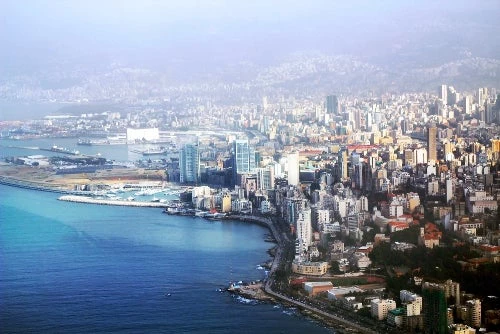 “The Paris of the Middle East”, “the Switzerland of the Middle East”, “the Pearl of the Mediterranean”, all these descriptions are used to paint a magical image of Lebanon and its capital city, Beirut. Pictures of snow-capped mountains—with bikini-clad socialites in the foreground, barely beyond a wave’s reach—made Lebanon famous for being the most diverse and tolerant country in the region.
“The Paris of the Middle East”, “the Switzerland of the Middle East”, “the Pearl of the Mediterranean”, all these descriptions are used to paint a magical image of Lebanon and its capital city, Beirut. Pictures of snow-capped mountains—with bikini-clad socialites in the foreground, barely beyond a wave’s reach—made Lebanon famous for being the most diverse and tolerant country in the region.
The call to prayer from the tall minaret competes with techno music from the pub next door, while everyone enjoys two national Christmas holidays (Catholic and Orthodox). Millions of Lebanese expatriates and their descendants from across five continents recount such stories to their more recent compatriots, keeping them mesmerized over plates of hummus and tabbouleh.
So why is Lebanon failing?
A complicated matrix of the opposing interests that drove the Lebanese civil war (1975–90) was finally, and successfully, balanced out in the 1989 Taif Agreement, which adjusted and institutionalized the power-sharing formula for Lebanon’s different confessional communities. The agreement brought about a more equitable distribution of power, but in doing so, further entrenched confessional-ism in the Lebanese system of governance—marked most visibly by the constitutionalization of the sectarian ownership of the top three positions in the country: the President of the Republic (Maronite), the Speaker of Parliament (Shia), and the Prime Minister (Sunni).
The war itself had involved international, regional and local players. At the end of it, the international balance of power led to the designation of Syria as the principal power broker in Lebanon through a direct military presence.
The peace époque brought into being a new ruling class dominated by warlords and oligarchs. The veil of confessional-ism became a powerful tool for them to use to thwart government reform, obstruct development, and even impede the full implementation of the Taif Agreement itself. The political elite used the public sector to advance and protect its own interests at the expense of the State. Wealth became concentrated in the hands of a few families as the middle class shrank. This elite came to command the country’s main economic resources, generating large rents, and dividing the spoils of a dysfunctional state among themselves.
In the process, the public sector has become increasingly governed by bribery and nepotism, failing to deliver even the most basic public services and incapable of resolving the country’s most urgent needs: electricity and water supplies are chronically deficient; a visually powerful—and odorous!—garbage crisis has left piles of garbage uncollected on the streets. All the while, Lebanon continues to face momentous challenges emanating from the war in Syria, including playing host to more than a million Syrian refugees.
The end of the Syrian presence in 2005 denied the Lebanese system its principal power broker, exposing the fragile predisposition of its structure. Since then, the deterioration of governance has become increasingly palpable.
Pervasive elite capture and the patronage system have pushed Lebanon’s post-war governance toward systemic failure. This has culminated in the comprehensive breakdown of the political process with the three branches of government either vacant or effectively idle, and the only national plebiscite—parliamentary elections—abrogated. As a result, protests and civil disobedience have erupted, targeting the ruling political class and emphasizing its corruption and incompetence.
The call to prayer still competes with techno music and, once again, everyone will enjoy two national Christmas holidays this season. However, systematic failures in governance in the face of seismic shocks in an environment of endemic corruption could result in rupture.
As things are, conditions are unsustainable and, without significant political and economic reforms, widening and worsening socio-economic unrest is not beyond the realms of possibility. The popular demonstrations and civil rights’ activities—directed at the political class—that the country has recently witnessed is just one manifestation of this. It is thus imperative and urgent for policy-makers to address Lebanon’s longstanding structural bottlenecks.


Join the Conversation